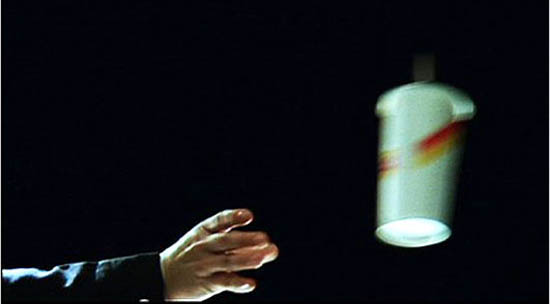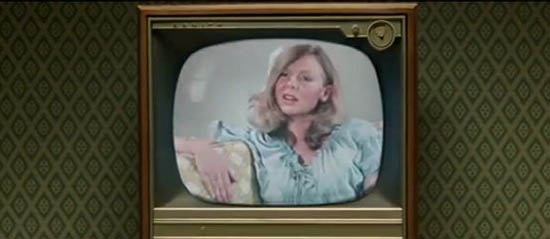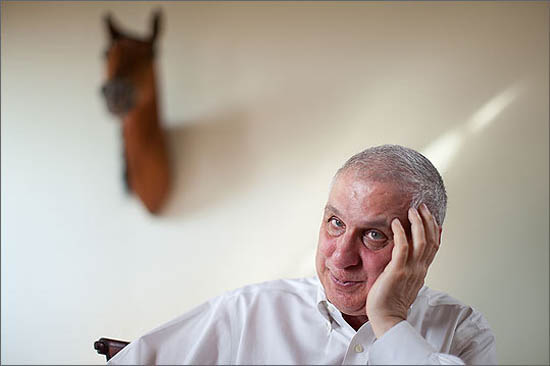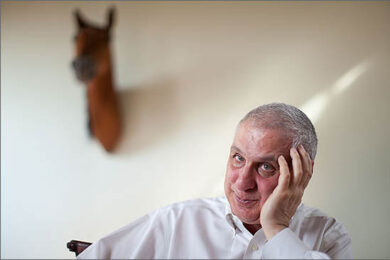Last Sunday, Errol Morris presented the annual David Lean lecture at BAFTA headquarters in honour of the reintroduced Documentary Feature category. The fact that for the past 20 years BAFTA has not had a documentary category certainly says something about how marginalized the genre still is today. In the eyes of some a documentary’s role is merely to passively inform, and its craft should be left to technicians, not artists. Truth and objectivity are the natural result of an almost puritanical, hair-shirt style of only handheld cameras and natural lighting.
But in the lecture and the Adam Curtis-hosted Q&A that follows, Morris stresses that there is no style which “bears the stamp of truth”. For Morris, there is a “bottomless reality” which needs investigating, and many different ways of approaching it – including Curtis’ own, very different essay-film style. Curtis asks him if he considers himself a journalist and if his work is an attempt to reinvigorate the dying art of investigative journalism. Morris tentatively agrees but contests that “…the term investigative journalism is redundant. Journalism without investigation is gossip.”
With his distinctly New York accent, Morris is a thoughtful and laconic speaker, but is also prone to sudden outbursts of gesticulation and shouting when making a point, always followed up by his famous mischievous smile. He becomes particularly animated when an audience member asks “…but isn’t truth relative?” Big mistake.
Morris’s first film, Gates of Heaven, about two competing pet cemeteries, was completed partly to win a bet with friend Werner Herzog and resulted in the latter publicly eating his shoe. But his most significant work was true-crime doc The Thin Blue Line (1988) which went up for several awards despite not being considered a documentary. It was controversial for its use of artistically shot re-enactments yet it was convincing enough to get a man off death row for a crime he didn’t commit.
Morris is also famous for a device he calls the Interrotron: an interview set up in which Morris’s video image appears on a teleprompter in front of the camera lens, allowing the interviewee to make natural eye contact with the camera. He explains to me that this makes both interviewer and interviewee incredibly focused. Whether it’s this simple trick or Morris’s calm and curious demeanour, it’s clear that his subjects divulge far more than your average talking heads.
Morris also deplors what he calls the “adversarial interview” – the standard practice of prime time newsmen like Paxman – because it purports that you already know the answers before the interview starts. Morris simply lets his subjects talk and even allows them to participate in the process of creating the interview – showing them the footage and giving them ultimate veto power, though he will always fight them on it. He has always been able to, as he says, “broker some kind of solution.”
Despite these best intentions he was sued by the death row inmate whose life he saved and, just days ago, by Joyce McKinney, the subject of his newest film Tabloid. The film concerns a ’70s scandal in which young, innocent-seeming American pin-up Joyce flew to Britain to take back her Mormon boyfriend, allegedly kidnapping him and imprisoning him as a sex slave. The tabloids turned her into an instant celebrity, almost of the sickeningly overexposed modern day variety. Years later she was in the papers again for cloning her dog (look it up).
Despite the title, Tabloid is more of a character study, like his earlier films, rather than a comment about journalism per se. When I ask him to compare journalism then and now, he replies that the Joyce case may have been a crime against journalism or good taste, but the News of the World scandal was actually criminal.
Speaking after the lecture in an office, one can easily imagine his kindly face projected on the Interrotron and the interview atmosphere he creates. He is a very generous interviewee but almost impossible to steer in the discussion and several of my questions are skilfully deflected. In the end, like his interviewees, it’s best to let him talk.

Firstly, I was wondering if you could talk a bit about how you chose Adam Curtis to host the event – what you see in his films, which are very different in style to yours, and how you were first introduced to his work?
Errol Morris: I was first introduced, I believe, by Thom Luddy who is a friend of Adam’s and a friend of mine. I believe it was through Tom that I first saw The Power of Nightmares, and I tried very hard to get The Power of Nightmares distributed in the United States. … The problem of course, not just simply the length, is that as we all know these films are composed in part of found footage. And, as I understand it – I could be wrong – you have a huge quantity of material that is in the BBC library, cleared for use in the UK, but the minute you bring it across to the United States there are clearance problems. I was told that the task of clearing all this material was an insuperable task… or close to insuperable.
It was interesting to hear your stance on ‘adversarial interviews’ – the ’60 minutes thing’ as you said. I really like your idea of ‘just letting people talk’ and it reminded me of certain types of psychoanalysis, and was wondering if you’ve ever experienced anything like counter transference?
EM: Certainly I have thought about this over the years – both as a psychiatric patient, a person who has been on the couch off and on, and as an interviewer. There is a psychiatric element.. [long pause] I’m not sure where my interviewing style came from, I never know. It was probably influenced by psychiatry on some level. I might have been talking about this last night, and if I was then forgive me, but I used to play games during interviews – to see how long someone could talk before you would interrupt them. That became part of the deal early on…. less so now. Now I interrupt quite often for whatever reason.
And you still use the Interrotron?
EM:Yes of course I do.
When you first started using it was there any particular incident that convinced you that ‘this was working, that this was the correct method for you?
EM: Well, I was convinced by it long before I actually had created it, because I felt the need for eye contact. I’m mean it’s an artefact of making a movie that you put a camera on somebody and you interview them. But do you look at the camera or look at the interviewer? You can’t look at the interviewer and the camera at the same time except with the interrrotron, [it] solves that problem.
Is the eye contact for the benefit of the interviewee, or for the benefit of the audience?
Both! Once I started using it it became apparent immediately that… if we’re seated in a room, you’re interviewing, and there’s a camera recording this interview, in the periphery of your vision there is always this third eye, and… What happens is the minute you put a prompter in front of the camera the camera becomes invisible … there is no distraction, and all of a sudden everything is focused in an extraordinary way, so it’s not just that you have eye contact.
Last night you were also talking about how there’s no particular style that is associated with truth.
EM: Yes, I think that’s nonsense talk.

…but are there certain styles that go with certain stories? So how does the style for the re-enactments in the film come about?
EM. Sure. There are ways to tell a story that work or don’t work. I mean, The Thin Blue Line, which was criticized at the time it came out for the use of re-enactments and music by Philip Glass etc., I felt that that style was a way of powerfully telling about an investigation. I mean, the example that I always give is that I have this milkshake that is tossed in slow motion, and the milkshake splatters on the ground and there’s a diagram – this was an actual diagram that came from the Dallas police and they had meticulously laid out this crime scene. Part of The Thin Blue Line is a a set of questions about who saw what, when… Well, one of the questions was the police woman: where was she when the shots were fired? Did she even get out of the police car? The milkshake was a way of focusing the audience’s attention on “where was she?”
So moving on to Tabloid, I though it was interesting, style-wise, after doing several political films, that this one was very funny. I think there are moments of humour in all of your films – a kind of human comedy – but how do you negotiate being respectful with humour?
EM. I don’t know, it’s been tricky for me. It was tricky with Gates of Heaven, my first film, because it was really, really funny. There was a perception, maybe not an unfounded one, that if something is funny then you’re being cruel or mean-spirited. I don’t completely agree, though I understand the nature of the complaint. For better or for worse I chose all these tabloid devices in the movie, the words on the screen, the animations etc. I thought they kind of went with the story – the absurdity of the story. But there is always that danger that if you’re telling a story about real people that you’ve gone too far, that you’ve not been respectful enough. I mean, I like Joyce. If you ask me if I like her, then yes, I do.
Well, it’s very sympathetic.
EM: I’d like to think that it’s sympathetic, yes.
But Joyce is an interesting character and I think there may be other people you’ve dealt with in the past who like being on camera and like being famous. Is this a tool you end up using? Is that important?
EM: Well, with Joyce it’s just the fact of the matter. I don’t think I used it. I mean one of the things that makes Joyce so complicated and interesting is the fact that she isn’t a complete victim. She might like to see herself as a complete victim but she isn’t. It’s not to say that the Mormon church didn’t do bad things to her, the tabloids didn’t do bad things to her, but she is a participant in this stuff. Y’know – you come to England with Smith & Wesson handcuffs, a bottle of chloroform, a radio with microphones embedded… You come to the UK with the intention of, if you have to, abducting your ex boyfriend and then people start writing about that…

I also think the order of the film is interesting: as you go along, a bit of information pops up that complicates someone’s account, and then another. So how do you select the order in which you reveal things? Are they in the order you discovered them?
EM: It’s usually a complicated process of trying to make this… I recorded six interviews for the movie, turning that into drama or turning that into storytelling is not easy. In fact, it’s a stupid way to work, I sometimes think! Because you take something which is inherently not dramatic, not necessarily, and you try and turn it into drama!
And not linear!
EM: Yes… I like the big chunks of stuff that seem to work: the big chunks of Peter Torre and Kent Gavin and Jackson Shaw, but it was a hard movie to put together, I can say that much.
And did you know about the cloned dog story before?
EM: Well sure. That’s what attracted me to it. I just read about it in the paper, it was “cloned dogs” and at the bottom of the article “32 year old sex and chains story.” I knew nothing about the ’80s story until I read about it recently.
And at what point in the process did you realise that the Mormon ex-boyfrield wouldn’t appear in the film? Because it’s almost more interesting for him not being there.
EM: Yeah, I think the movie actually benefits [chuckles] from the absence of certain figures. We knew pretty early on; we sent him registered letters. I kept trying to find Steve Moskowitz, tried to find [Joyce’s] so called call-girl partner in Los Angeles, Laura… Couldn’t find her.
It feels like this has been a good decade for political documentaries. Do you have any favourites, or ones you find particularly important?
EM: Well there’s a couple that I’ve made [pause for effect]. I don’t really love ‘political’ documentaries and I’ll tell you why. I don’t like films – and I have my own political sensibilities – I don’t like films that preach to the choir. I don’t like films that say things that are completely predictable and expected. I don’t like films that are really not investigative. Both Fog of War and Standard Operating Procedures are good examples, both of which were criticized because they didn’t do what they were [sarcastic air quotes] ‘supposed’ to do. Fog of War didn’t go after Robert S. McNamera’s jugular and wrestle him to the mat and take him to task for Vietnam. Standard Operating Procedures was not so much about the Bush administration and torture, which really it should be about. But really it was about something which really interested me: having just made a movie about the Secretary of Defence during the Kennedy and Johnson administrations, I had an opportunity to see people not at the very top of the pyramid, but at the very bottom, and how they reacted to being trapped in this prison as very lowly soldiers: privates, specialists. What really interested me was ‘Who were these people?’
It’s another reason I like Adam Curtis’ films because, yes, they’re essay films, but they’re very idiosyncratic and personal films. I got to tell Adam this last night and it’s heartfelt: I’ve learned of things from him. There’s stuff which is completely unexpected and interesting, so if the idea of a political film is just simply to tell me once again how bad the Bush administration is and his policy is, or if the purpose is to tell me that torture is despicable and deplorable… I’m glad that those movies exist, I think it’s important that there’s a whole cadre of political filmmaking, but if you ask me the kinds of movies that I really, really like, it’s the stuff that surprises us and teaches us something about the world that we might not know already.
The David Lean Lecture was presented by BAFTA and streamed live on their GURU website last Sunday. Tabloid is in UK cinemas from today.




